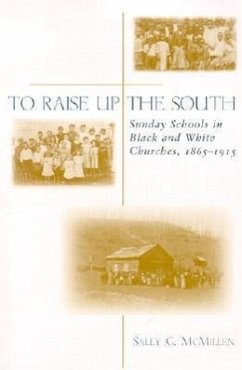In the half century after the Civil War, evangelical southerners turned increasingly to Sunday schools as a means of rejuvenating their destitute region and adjusting to an ever-modernizing world. By educating children -- and later adults -- in Sunday school and exposing them to Christian teachings, biblical truths, and exemplary behavior, southerners felt certain that a better world would emerge and cast aside the death and destruction wrought by the Civil War. In To Raise Up the South, Sally G. McMillen offers an examination of Sunday schools in seven black and white denominations and reveals their vital role in the larger quest for southern redemption. McMillen begins by explaining how the schools were established, detailing northern missionaries' collaboration in their creation and the eventual southern resistance to this northern aid. She then turns to the classroom, discussing the roles of church officials, teachers, ministers, and parents in the effort to raise pious children; the different functions of men and women; and the social benefits of such participation. Though denominations of both races saw Sunday schools as a way to increase their numbers and mold their children, white southerners rarely raised the race issue in the classroom. Black evangelicals, on the other hand, used their Sunday schools to discuss and decry Jim Crow laws, rising violence, and widespread injustices. Integrating the study of race, class, gender, and religion, To Raise Up the South provides an exciting new lens through which to view the turbulent years of Reconstruction and the emergence of the New South. It charts the rise of an institution that became a mainstay in the lives of millions ofsoutherners.
Bitte wählen Sie Ihr Anliegen aus.
Rechnungen
Retourenschein anfordern
Bestellstatus
Storno





